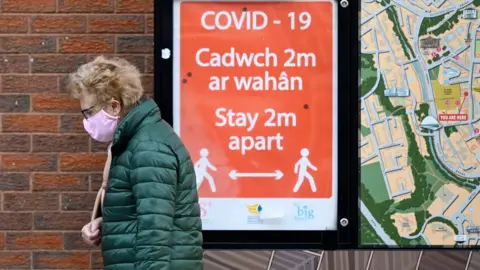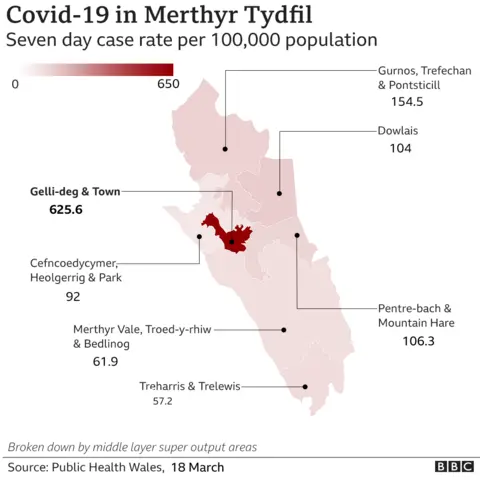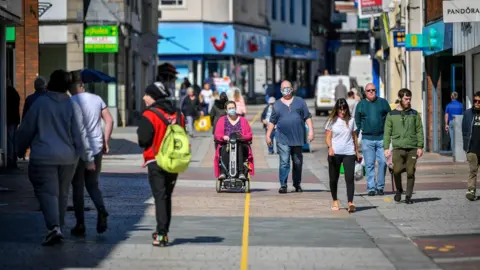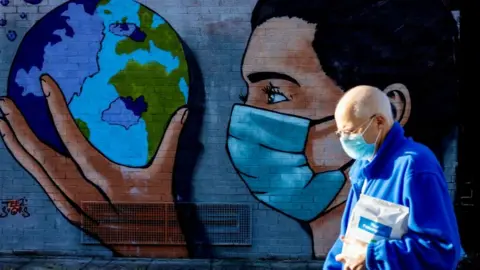Covid: Merthyr Tydfil flare-up 'down to loss of discipline'
 Getty Images
Getty ImagesExtended households and workplaces are behind a rise in Covid cases in Merthyr Tydfil, a health chief has said.
The flare-up was down to "a bit of a loss of discipline" said Dr Kelechi Nnoaham, director of public health for Cwm Taf Morgannwg health board.
Localised hotpot Gellideg and Merthyr Town has had 44 cases in the past week, nearly half of those in the local area.
The county has a seven-day case rate of 159.1 per 100,000 population compared to the Wales average of 43.3.
This was the fourth highest case rate in the UK on Thursday.
Covid rules currently allow most people to only meet indoors with people they live with.
Merthyr council has responded by setting up a mobile testing unit at the Swansea Road estate.

The hotspot in Gellideg and Town is at a rate of 625.6 per 100,000 for the past seven days, by far the highest of these localised case rates in Wales.
Dr Nnoaham told BBC Radio Wales Breakfast with Claire Summers: "We have identified about four different clusters that are largely responsible for the increase in cases that we have had.
"We know that a number of workplaces have been involved in this cluster, we know there has been an extended household cluster in one of the areas.
"I think we understand exactly why this has happened and I just want to use the opportunity to appeal to people out there that whilst we're making progress in the vaccination programme we're by no means home and dry and we still need to maintain those precautions and be extra vigilant."
 PA Media
PA MediaHe said the spread was largely down to young people in the area.
"When we looked at the age profile of the majority of the cases and these clusters, what we're talking about is largely young people who have not had their vaccination," he said.
"And secondly, it does appear that the loss of discipline around the social distancing [and] face masks has been more likely in the younger populations.
"There's a bit of a loss of discipline that has happened more recently".
He urged people to watch Saturday's Grand Slam between Wales and France at home and not with friends and family.
Only those who live alone, are single and live in a house share, single parents, families with babies and 16 and 17-year-olds who do not live with an adult had been able to form a so-called "support bubble".
Four people from two households can meet outdoors to socialise, including in gardens.
 Getty Images
Getty ImagesThe case rate in Merthyr Tydfil was again the highest case rate in Wales.
This is the highest point reached locally in the past six weeks, but still a long way from the levels seen in previous months.
Cases in the area hit a peak of 1,349 per 100,000 on 18 December, two days before Wales was placed under a national lockdown, with the county having the worst case rate in the UK.
At the time officials blamed the spike in cases on the "closeness" and "tight-knit" nature of valleys communities, with people living close to extended family and friends and popping round to check on their neighbours.
In an area with high rates of deprivation, there were also concerns about people having to make tough choices between going to work to get paid and isolating if contacted by tracers.
At the start of February there was a feeling of hope as case rates fell to some of the lowest in Wales, but there were warnings they could rise again as people became weary of lockdown measures.
